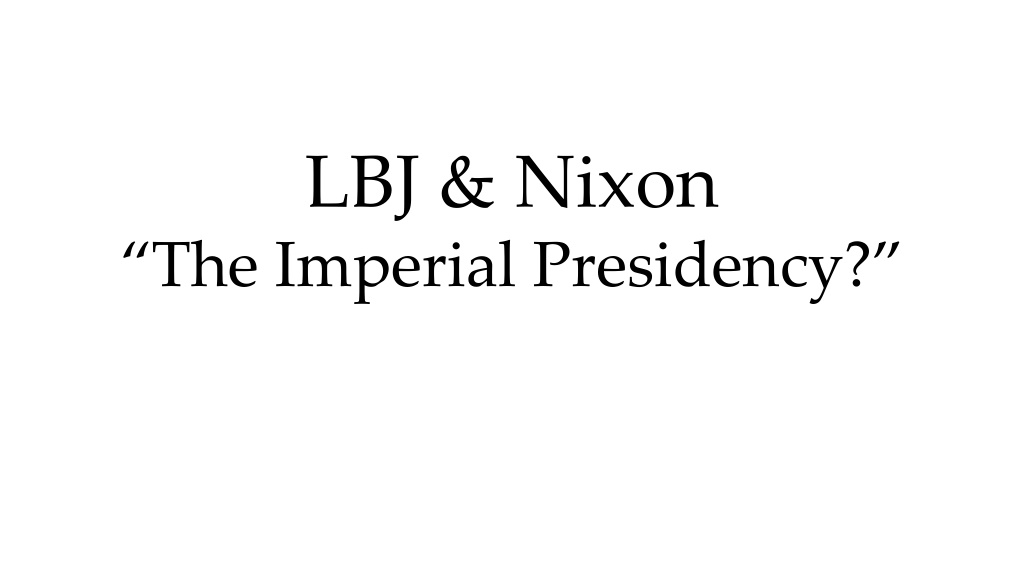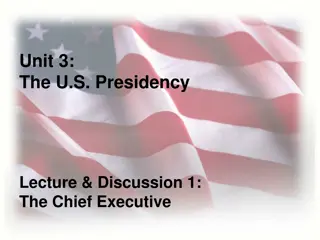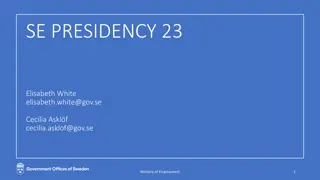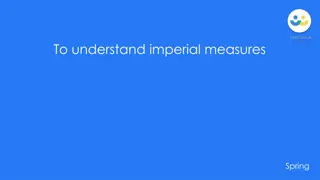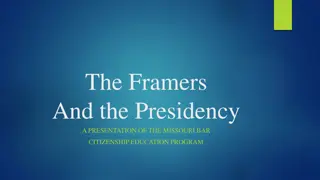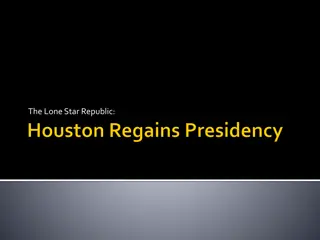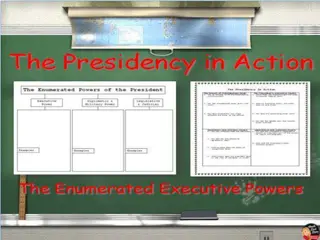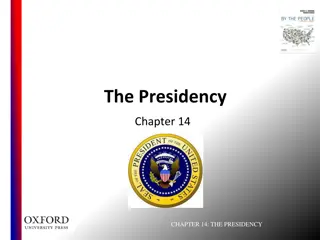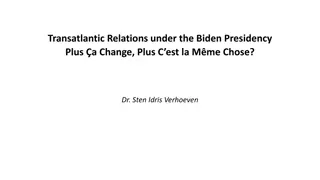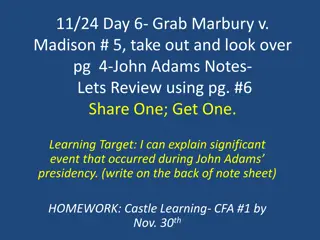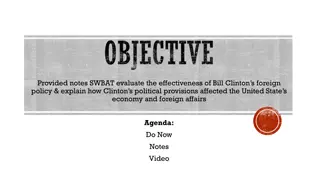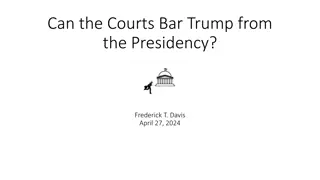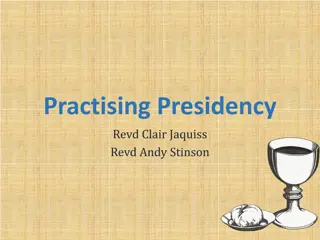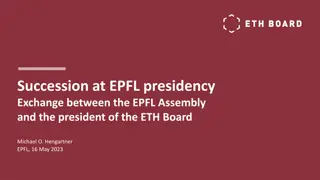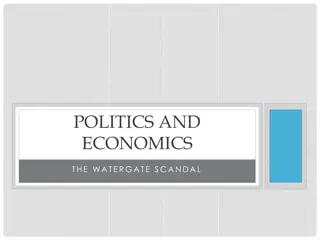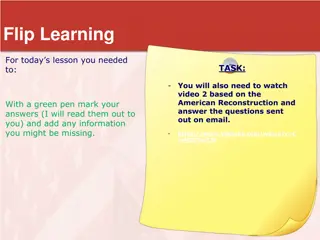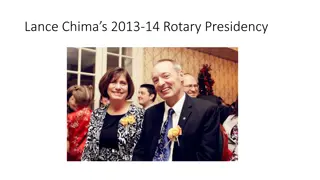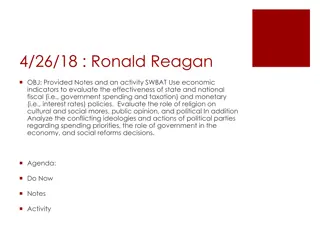LBJ & Nixon - The Imperial Presidency?
Beginning with Franklin D. Roosevelt in the Great Depression and World War II, the Imperial Presidency concept emerged as a concern among historians and political scientists. This trend heightened during the Cold War Era, expanding Executive Powers. Evaluate the actions of Presidents Lyndon B. Johnson and Richard M. Nixon to assess if they adhered to democratic leadership norms.
Download Presentation

Please find below an Image/Link to download the presentation.
The content on the website is provided AS IS for your information and personal use only. It may not be sold, licensed, or shared on other websites without obtaining consent from the author.If you encounter any issues during the download, it is possible that the publisher has removed the file from their server.
You are allowed to download the files provided on this website for personal or commercial use, subject to the condition that they are used lawfully. All files are the property of their respective owners.
The content on the website is provided AS IS for your information and personal use only. It may not be sold, licensed, or shared on other websites without obtaining consent from the author.
E N D
Presentation Transcript
LBJ & Nixon The Imperial Presidency?
LBJ & Nixon - The Imperial Presidency? Starting with Franklin D. Roosevelt in the Great Depression and World War II, the concept of an Imperial Presidency, a President who is no longer bound by the normal restraints of the checks and balance system, has become a concern among historians and political scientists. The trend toward an Imperial Presidency escalated during the Cold War Era, when U.S. Presidents assumed the unelected role of Leader of the Free World in confronting the Soviet Union, leading to the vast expansion of Executive Powers and the scope of Executive Privilege. Read the following documents about the actions of President Lyndon B. Johnson and President Richard M. Nixon and evaluate whether the two Cold War Era leaders stayed within or exceeded the expectations and traditions that the President be a democratic leader who was answerable to the people through Congress. For further background information and context visit:https://millercenter.org/the-presidency/teacher- resources/recasting-presidential-history/presidency-crisis
LBJ & The Gulf of Tonkin Resolution Eighty-eighth Congress of the United States of America AT THE SECOND SESSION Begun and held at the City of Washington on Tuesday, the seventh day of January, one thousand nine hundred and sixty-four Joint Resolution To promote the maintenance of international peace and security in southeast Asia. Whereas naval units of the Communist regime in Vietnam, in violation of the principles of the Charter of the United Nations and of international law, have deliberately and repeatedly attacked United States naval vessels lawfully present in international waters, and have thereby created a serious threat to international peace; and Whereas these attackers are part of deliberate and systematic campaign of aggression that the Communist regime in North Vietnam has been waging against its neighbors and the nations joined with them in the collective defense of their freedom; and Whereas the United States is assisting the peoples of southeast Asia to protest their freedom and has no territorial, military or political ambitions in that area, but desires only that these people should be left in peace to work out their destinies in their own way: Now, therefore be it Resolved by the Senate and House of Representatives of the United States of America in Congress assembled, That the Congress approves and supports the determination of the President, as Commander in Chief, to take all necessary measures to repel any armed attack against the forces of the United States and to prevent further aggression. Section 2. The United States regards as vital to its national interest and to world peace the maintenance of international peace and security in southeast Asia. Consonant with the Constitution of the United States and the Charter of the United Nations and in accordance with its obligations under the Southeast Asia Collective Defense Treaty, the United States is, therefore, prepared, as the President determines, to take all necessary steps, including the use of armed force, to assist any member or protocol state of the Southeast Asia Collective Defense Treaty requesting assistance in defense of its freedom. Section 3. This resolution shall expire when the President shall determine that the peace and security of the area is reasonably assured by international conditions created by action of the United Nations or otherwise, except that it may be terminated earlier by concurrent resolution of the Congress.
LBJ & The Gulf of Tonkin Resolution Respond to the following questions by identifying and explaining the sections of the Gulf of Tonkin Resolution that apply. 1. What Executive Power was expanded by the Gulf of Tonkin Resolution? 1. What Checks on Executive Powers were removed by the Gulf of Tonkin Resolution?
LBJ & The Gulf of Tonkin Resolution Respond to the following prompts by identifying and explaining the sections of the Gulf of Tonkin Resolution that apply. 3. Evaluate and explain why some believe the Gulf of Tonkin Resolution expanded Executive authority beyond democratic norms in American government. 4. check Describe and explain how the War Powers Act was meant to restore a on the President s authority as Commander in Chief.
Nixon: Watergate, the Pentagon Paper & Executive Privilege August 15, 1973: Nixon s Address to the Nation About the Watergate Investigation Good evening: Now that most of the major witnesses in the Watergate phase of the Senate committee hearings on campaign practices have been heard, the time has come for me to speak out about the charges made and to provide a perspective on the issue for the American people. For over four months, Watergate has dominated the news media. During the past three months, the three major networks have devoted an average of over 22 hours of television time each week to this subject. The Senate committee has heard over 2 million words of testimony Because the abuses occurred during my Administration, and in the campaign for my reelection, I accept full responsibility for them. I regret that these events took place, and I do not question the right of a Senate committee to investigate charges made against the President to the extent that this is relevant to legislative duties. However, it is my constitutional responsibility to defend the integrity of this great office against false charges. I also believe that it is important to address the overriding question of what we as a nation can learn from this experience and what we should now do. I intend to discuss both of these subjects tonight .
Nixon: Watergate, the Pentagon Paper & Executive Privilege August 15, 1973: Nixon s Address to the Nation About the Watergate Investigation Many have urged that in order to help prove the truth of what I have said, I should turn over to the Special Prosecutor and the Senate committee recordings of conversations that I held in my office or on my telephone. However, a much more important principle is involved in this question than what the tapes might prove about Watergate. Each day, a President of the United States is required to make difficult decisions on grave issues. It is absolutely necessary, if the President is to be able to do his job as the country expects, that he be able to talk openly and candidly with his advisers about issues and individuals. This kind of frank discussion is only possible when those who take part in it know that what they say is in strictest confidence. The Presidency is not the only office that requires confidentiality. A Member of Congress must be able to talk in confidence with his assistants; judges must be able to confer in confidence with their law clerks and with each other. For very good reasons, no branch of Government has ever compelled disclosure of confidential conversations between officers of other branches of Government and their advisers about Government business. would want to talk frankly about the Congressional horse-trading that might get a vital bill passed. No one would want to speak bluntly about public figures here and abroad. That is why I shall continue to oppose efforts which would set a precedent that would cripple all future Presidents by inhibiting conversations between them and those they look to for advice. This principle of confidentiality of Presidential conversations is at stake in the question of these tapes. I must and I shall oppose any efforts to destroy this principle, which is so vital to the conduct of this great office
Nixon: Watergate, the Pentagon Paper & Executive Privilege August 15, 1973: Nixon s Address to the Nation About the Watergate Investigation Let me turn now to the difficult questions that arise in protecting the national security. It is important to recognize that these are difficult questions and that reasonable and patriotic men and women may differ on how they should be answered. Only last year, the Supreme Court said that implicit in the President's constitutional duty is "the power to protect our Government against those who would subvert or overthrow it by unlawful means." How to carry out this duty is often a delicate question to which there is no easy answer. For example, every President since World War II has believed that in internal security matters, the President has the power to authorize wiretaps without first obtaining a search warrant. An act of Congress in 1968 had seemed to recognize such power. Last year the Supreme Court held to the contrary. And my Administration is, of course, now complying with that Supreme Court decision. But until the Supreme Court spoke, I had been acting, as did my predecessors President Truman, President Eisenhower, President Kennedy, and President Johnson in a reasonable belief that in certain circumstances the Constitution permitted and sometimes even required such measures to protect the national security in the public interest. Although it is the President's duty to protect the security of the country, we, of course, must be extremely careful in the way we go about this for if we lose our liberties we will have little use for security. Instances have now come to light in which a zeal for security did go too far and did interfere impermissibly with individual liberty. It is essential that such mistakes not be repeated. But it is also essential that we do not overreact to particular mistakes by tying the President's hands in a way that would risk sacrificing our security, and with it all our liberties. I shall continue to meet my constitutional responsibility to protect the security of this Nation so that Americans may enjoy their freedom. But I shall and can do so by constitutional means, in ways that will not threaten that freedom.
Nixon: Watergate, the Pentagon Paper & Executive Privilege 1. What are the two arguments that Nixon makes to support his belief that Executive Privilege extends to records of meetings and conversations within the Executive Branch? 1. What argument does Nixon make that exercising Executive Privilege in that manner is not undemocratic or unconstitutional?
Nixon: Watergate, the Pentagon Paper & Executive Privilege April 29, 1974: Richard Nixon s Address to the Nation on Presidential Tape Recordings Good evening: I have asked for this time tonight in order to announce my answer to the House Judiciary Committee's subpoena for additional Watergate tapes, and to tell you something about the actions I shall be taking tomorrow about what I hope they will mean to you and about the very difficult choices that were presented to me. These actions will at last, once and for all, show that what I knew and what I did with regard to the Watergate break-in and coverup were just as I have described them to you from the very beginning The task of Chairman Rodino and Congressman Hutchinson will be made simpler than was mine by the fact that the work of preparing the transcripts has been completed. All they will need to do is to satisfy themselves of their authenticity and their completeness. Ever since the existence of the White House taping system was first made known last summer, I have tried vigorously to guard the privacy of the tapes. I have been well aware that my effort to protect the confidentiality of Presidential conversations has heightened the sense of mystery about Watergate and, in fact, has caused increased suspicions of the President. Many people assume that the tapes must incriminate the President, or that otherwise, he would not insist on their privacy. But the problem I confronted was this: Unless a President can protect the privacy of the advice he gets, he cannot get the advice he needs.
Nixon: Watergate, the Pentagon Paper & Executive Privilege April 29, 1974: Richard Nixon s Address to the Nation on Presidential Tape Recordings This principle is recognized in the constitutional doctrine of executive privilege, which has been defended and maintained by every President since Washington and which has been recognized by the courts, whenever tested, as inherent in the Presidency. I consider it to be my constitutional responsibility to defend this principle. Three factors have now combined to persuade me that a major unprecedented exception to that principle is now necessary: First, in the present circumstances, the House of Representatives must be able to reach an informed judgment about the President's role in Watergate. Second, I am making a major exception to the principle of confidentiality because I believe such action is now necessary in order to restore the principle itself, by clearing the air of the central question that has brought such pressures upon it and also to provide the evidence which will allow this matter to be brought to a prompt conclusion. Third, in the context of the current impeachment climate, I believe all the American people, as well as their representatives in Congress, are entitled to have not only the facts but also the evidence that demonstrates those facts.
Nixon: Watergate, the Pentagon Paper & Executive Privilege April 29, 1974: Richard Nixon s Address to the Nation on Presidential Tape Recordings I want there to be no question remaining about the fact that the President has nothing to hide in this matter. The impeachment of a President is a remedy of last resort; it is the most solemn act of our entire constitutional process. Now, regardless of whether or not it succeeded, the action of the House, in voting a formal accusation requiring trial by the Senate, would put the Nation through a wrenching ordeal it has endured only once in its lifetime, a century ago, and never since America has become a world power with global responsibilities. The impact of such an ordeal would be felt throughout the world, and it would have its effect on the lives of all Americans for many years to come.
Nixon: Watergate, the Pentagon Paper & Executive Privilege 3. How does Nixon explain sharing the recordings of conversation with Congress while still claiming they are protected by Executive Privilege? 4. likelihood or necessity of an impeachment? What warning does Nixon give in an effort to deflect or reduce the
LBJ & Nixon - The Imperial Presidency? 1. Did Lyndon B. Johnson and Richard M. Nixon believe being President put them above the law? 1. During wars, Presidents have generally been allowed to stretch the boundaries of Executive Power for the duration of the conflict. Did the long term expansion of Executive Authority (i.e. the Imperial Presidency ) during the Cold War undermine the Presidency as a democratic institution?
Nixon: Watergate, the Pentagon Paper & Executive Privilege For More on Watergate https://millercenter.org/the-presidency/educational- resources/watergate/watergate-cover August 15, 1973: Nixon s Address to the Nation About the Watergate Investigation https://millercenter.org/the-presidency/presidential-speeches/august-15-1973- address-nation-about-watergate-investigations April 19, 1974: Nixon s Address to the Nation of Presidential Tape Recordings https://millercenter.org/the-presidency/presidential-speeches/april-29-1974- address-nation-presidential-tape-recordings
